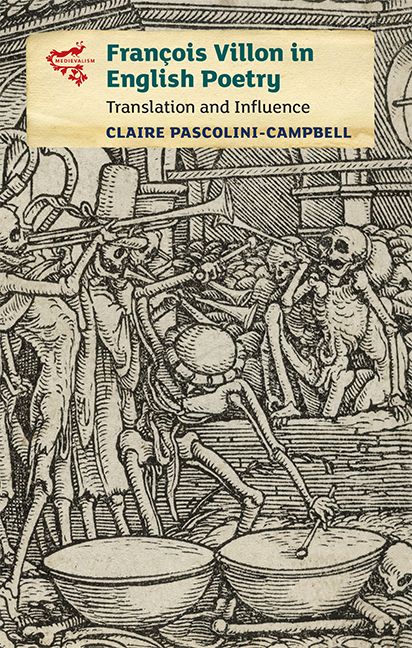Book contents
- Frontmatter
- Contents
- A Note on the Poets and the Poems
- Acknowledgements
- Introduction
- 1 Then and Now: The Legend of Villon in the Middle Ages and in Modernity
- 2 Villon and Swinburne: Finding and Singing Villon
- 3 Villon and Rossetti: Poetics of Strangeness
- 4 Villon and Pound: Modernity and the ‘Mediaeval Dream’
- 5 Villon and Bunting: Prison-Writing and Parody
- 6 Villon and Lowell: Imitation and the Visible Translator
- Conclusion
- Appendices
- Bibliography
- Index
- Medievalism
2 - Villon and Swinburne: Finding and Singing Villon
Published online by Cambridge University Press: 09 October 2019
- Frontmatter
- Contents
- A Note on the Poets and the Poems
- Acknowledgements
- Introduction
- 1 Then and Now: The Legend of Villon in the Middle Ages and in Modernity
- 2 Villon and Swinburne: Finding and Singing Villon
- 3 Villon and Rossetti: Poetics of Strangeness
- 4 Villon and Pound: Modernity and the ‘Mediaeval Dream’
- 5 Villon and Bunting: Prison-Writing and Parody
- 6 Villon and Lowell: Imitation and the Visible Translator
- Conclusion
- Appendices
- Bibliography
- Index
- Medievalism
Summary
ALGERNON CHARLES SWINBURNE (b. 1837–d. 1909) was a notorious, innovative, and influential figure in Victorian England. He is of particular significance to the present study since it was his interest in the medieval French poet that was to trigger a vogue of translation and imitation that flourished throughout the second half of the nineteenth century and well into the twentieth. His influence in bringing Villon to the attention of English poets cannot be over-estimated, and although critics have often looked to Dante Gabriel Rossetti as the founder of the English Villon, to do so is to ignore Swinburne's greater role. Swinburne was the first English poet to discover Villon, a figure for whom he had conceived a profound admiration since his boyhood, whose work he had been translating since at least as early as 1860, and to whose poetry he ultimately led Rossetti. The first task of this chapter will be to provide a survey of the evidence for Swinburne's discovery of Villon, situating his early affection for the medieval French poet as fundamental in shaping the latter's popularity amongst Anglophone poets. What it was about Villon that attracted Swinburne will also be examined and, with reference to his critically neglected (because unfinished) essay on Villon, we shall see that Villon was, for Swinburne, at once a window into the intriguing underbelly of medieval Paris, a mouthpiece through which to outrage Victorian critical propriety, and a source of exquisite forms and rhythms to be imitated. The chapter will conclude with a study of a selection of the translations themselves, demonstrating how fidelity to Villon's lyric forms and their ornaments of sound enabled Swinburne to cross temporal boundaries and make audible medieval song.
Finding Villon
While it is now commonplace to remark that Swinburne was subject to critical neglect and misrepresentation for the greater part of the twentieth century, it is equally certain that the shape of Swinburne studies has, since at least the centenary of his death, gathered increasing momentum. Contemporary criticism has redeemed the poet's failing fortunes, homing in on his important role in introducing French literature and Aesthetic criticism to England, his provocative challenging of the Victorian critical apparatus, and his musical ear, so clearly in evidence in the rhythms and forms of his verse.
- Type
- Chapter
- Information
- François Villon in English PoetryTranslation and Influence, pp. 32 - 56Publisher: Boydell & BrewerPrint publication year: 2018



